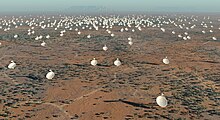Square Kilometre Array
 |
|
| Location(s) |
South Africa, Australia |
|---|---|
| Coordinates | 26°41′49″S 116°37′53″E / 26.697025°S 116.631289°ECoordinates: 26°41′49″S 116°37′53″E / 26.697025°S 116.631289°E |
| Built |
Phase 1 2018-2023 Phase 2 2023-2030 |
| First light | 2020 |
| Telescope style | |
| Collecting area | 1 km2 (11,000,000 sq ft) |
| Website | www |
|
|
|
|
[]
|
|
The Square Kilometre Array (SKA) is a large multi radio telescope project aimed to be built in Australia and South Africa. If built, it would have a total collecting area of approximately one square kilometre. It would operate over a wide range of frequencies and its size would make it 50 times more sensitive than any other radio instrument. It would require very high performance central computing engines and long-haul links with a capacity greater than the current global Internet traffic. It should be able to survey the sky more than ten thousand times faster than ever before.
With receiving stations extending out to distance of at least 3,000 kilometres (1,900 mi) from a concentrated central core, it would exploit radio astronomy's ability to provide the highest resolution images in all astronomy. The SKA would be built in the southern hemisphere, in sub-Saharan states with cores in South Africa and Australia, where the view of the Milky Way Galaxy is best and radio interference least.
Construction of the SKA is scheduled to begin in 2018 for initial observations by 2020, but the construction budget is not secured at this stage. The SKA would be built in two phases, with Phase 1 (2018-2023) representing about 10% of the capability of the whole telescope. Phase 1 of the SKA was cost-capped at 650 million euros in 2013, while Phase 2's cost has not yet been established. The headquarters of the project are located at the Jodrell Bank Observatory, in the UK.
The SKA—a global project with twelve member countries—aims to answer fundamental questions about the origin and evolution of the Universe. In the early days of planning, China vied to host the SKA, proposing to build several large dishes in the natural limestone depressions (karst) that dimple its southwestern provinces; China called their proposal Kilometer-square Area Radio Synthesis Telescope (KARST). In April 2011, Jodrell Bank Observatory of the University of Manchester, in Cheshire, England was announced as the location for the project headquarters.
...
Wikipedia
